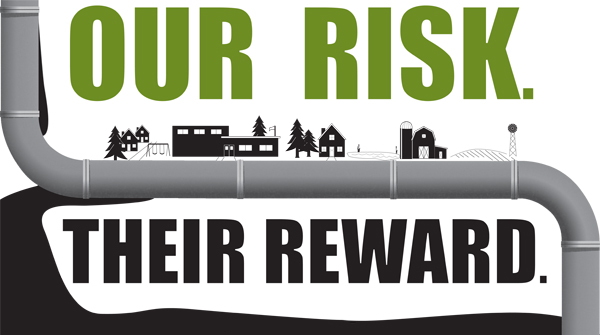There are compelling reasons to stop TransCanada’s proposed Energy East export pipeline. Expansion in the tar sands and Indigenous rights violations, significant climate change emissions and diluted bitumen pipeline spills are definitely at the top of my list.
An article in this week’s Toronto Star gives even more reason for people living in Ontario and Quebec — even higher heating bills and more U.S. imports of fracked gas.
How is this all connected?
The Energy East project seeks to convert an existing pipeline (part of TransCanada’s mainline system of pipelines) from Saskatchewan to Cornwall area in Ontario, This pipe supplies the region with natural gas.
As reported by the Toronto Star, Union Gas has sent TransCanada a letter stating clearly that they are opposed to the Energy East project because it threatens to leave Ontarians short on natural gas supply:
“‘Union….cannot agree to any proposal that removes a critical section of natural gas pipeline that is fully utilized to serve winter demand in eastern Canada and the U.S. Northeast for conversion to oil service,’ Union says. ‘An important piece of TransCanada’s pipeline is in the North Bay area, and is referred to as the North Bay Shortcut. Converting that section to serve oil markets will leave the remaining gas pipeline capacity ‘below the level required to meet existing contracted firm requirements'”
TransCanada denies the conversion will leave the region short on supply, pointing to their proposal for the Eastern Mainline, a new natural gas pipeline they want to build from Markham to Iroquois.
The catch? Even if this were to alleviate supply concerns — and this is far from certain — it still means people in Ontario and Quebec will be paying more to heat their homes.
As reported in the Toronto Star article, Union Gas estimates the price tag of this new pipe at $2 billion.
Who’s on the hook for these costs? Tax payers. This certainly is a hard pill to swallow coming out of an exceptionally cold winter, which caused natural gas prices to skyrocket and supply limits to industrial users.
TransCanada claims Union’s estimate is too high and highlights they will “contribute” to the cost. As an Ontarian reliant on natural gas to heat my home, I certainly don’t feel assured.
Making matters worse, Energy East would see Ontario and Quebec increasingly depend on fracked shale gas imports. “TransCanada wants to ship oil through its natural gas pipeline because shale gas produced in the U.S. northeast is displacing the gas that TransCanada’s mainline pipes in from western Canada.”
Not only is fracking having serious environmental, social and health impacts on our Southern neighbours, expert evidence commissioned by the Council of Canadians says relying on fracked gas also puts our natural gas supply at risk and paves the way for further cost increases.
In other words, TransCanada wants people in Ontario and Quebec to subsidize a tar sands export pipeline that comes with a host of risks, at source and along the pipeline path, and shoulder higher heating costs.
It’s time to take a stand and say no to Energy East.
Take action: www.noenergyeast.ca
More articles on the impacts of Energy East on natural gas supply:
Gas industry sees risk in vision for energy east oilline (August 2013)
Enbridge warns Ottawa councillors that energy east pipeline could lead to winter gas shortages (September 2013)
Another energy price increase could be looming for residents of eastern Ontario (May 2014)



